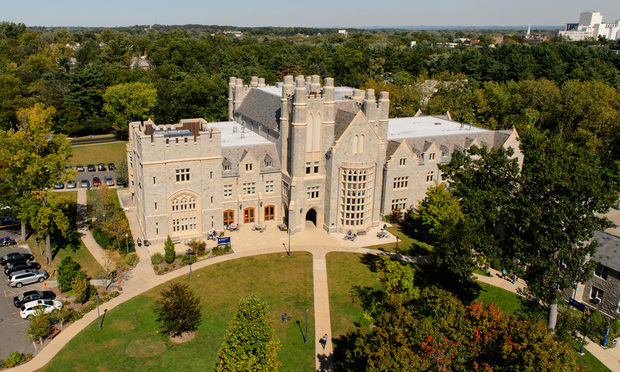Connecticut Reschedules Bar Exam Again—Now Online Only
The Connecticut Bar Examining Committee announced that the bar examination would be given in an online-only format.
July 23, 2020 at 05:04 PM
4 minute read
 The University of Connecticut School of Law in Hartford. Photo: Peter Morenus/UConn
The University of Connecticut School of Law in Hartford. Photo: Peter Morenus/UConn
Following a four-hour Zoom meeting Thursday, the Connecticut Bar Examining Committee announced it would once again reschedule the 2020 bar exam.
The committee announced during the meeting, with about 85 people attending, that the bar examination slated for Sept. 30 and Oct. 1 in Hartford would be pushed back to an online-only format on Oct. 5-6.
The controversial move followed similar decisions in other states, including New Jersey, Pennsylvania, Maryland and Massachusetts, which have decided to hold exams on the same two days.
Thursday's attendees complained that the meeting wasn't properly posted, and that the decision was made without their input. A group of recent law school graduates has asked the Rules Committee of the Superior Court to grant "diploma privilege," and do away with the upcoming bar exam.
Diploma privileges, which have been adopted in Utah, Oregon, Washington and Louisiana, allow for law school graduates to be licensed without having to take the exam, and are a response to COVID-19 health concerns.
University of Connecticut School of Law 2020 graduate Wyatt Bosworth, one of five organizers of a petition for the diploma privilege, told the Connecticut Law Tribune that CBEC did not adequately notice the meeting. He said the meeting was posted on the CBEC website, but not on its homepage, which would have been easier to locate. He added that graduates were never notified via email. Some came upon the notice "by happenstance" and notified others to join the Zoom meeting.
Echoing the petition, Bosworth said, "We have serious problems with the online exam. There is an equity concern and not everyone has stable Wi-Fi and not everyone has access to high-quality technology. This test would require a webcam and not everyone has one."
In addition, Bosworth said, "There is also a problem with the environment people live in. People could be distracted if they don't have access to a quiet study space or quiet testing environment. There is also a good chance the technology will not work as it's unproven and untested. An online bar exam has never happened in the history of the bar exam."
Bosworth said he'd be taking the online exam, though, because "my job and my livelihood depend on me getting my license and paying off debt." Bosworth said the petition for diploma privilege garnered nearly 500 signatures in just two days and was sent to Gov. Ned Lamont and state legislative leaders, as well as Attorney General William Tong.
Many law school graduates were allowed to speak at the end of the Zoom meeting of the examining committee, with some complaining the board had made its decision before getting public input.
"I heard very little comment or discussion on the concerns of the applicants," said University of Connecticut School of Law graduate Gabby Gelozin during an allotted three-minute address to the committee. "Almost all of the comments were about the burden on the committee."
Fellow 2020 University of Connecticut School of Law graduate Allison Conley agreed. "I echo the disappointment that a vote was taken without listening first."
During the meeting, CBEC chairwoman and Pullman & Comley member Anne Dranginis said, "There are differences of opinion about the necessity of the bar exam."
"I think part of what this committee has always taken seriously is the expectation from the public that we are vouching for the education you have received," Dranginis said during the meeting. She noted that one person emailed her recommending the board publish the names of anyone who gets a diploma privilege because the person commenting "would never want to hire such a person."
Rules Committee Chairman and Connecticut Supreme Court Justice Andrew McDonald did not respond to a request for comment Thursday.
Related stories:
Illinois and Ohio Move Bar Exam Online as Reciprocity Gains Traction
Louisiana Joins the Diploma Privilege Party, Will Let Law Grads Skip Bar Exam
This content has been archived. It is available through our partners, LexisNexis® and Bloomberg Law.
To view this content, please continue to their sites.
Not a Lexis Subscriber?
Subscribe Now
Not a Bloomberg Law Subscriber?
Subscribe Now
NOT FOR REPRINT
© 2025 ALM Global, LLC, All Rights Reserved. Request academic re-use from www.copyright.com. All other uses, submit a request to [email protected]. For more information visit Asset & Logo Licensing.
You Might Like
View All
From 'Confusing Labyrinth' to Speeding 'Roller Coaster': Uncertainty Reigns in Title IX as Litigators Await Second Trump Admin
6 minute read
Federal Judge Weighs In on School's Discipline for 'Explicitly Copying AI-Generated Text' on Project

'Substantive Deficiencies': Judge Grants Big Law Motion Dismissing Ivy League Price-Fixing Claims
3 minute read
Class Action Lawsuit Targets 40 Private Colleges and Universities Over Alleged Price-Fixing
3 minute readLaw Firms Mentioned
Trending Stories
- 1$5 Million Settlement Reached With Stone Academy
- 2$15K Family Vacation Turned 'Colossal Nightmare': Lawsuit Filed Against Vail Ski Resorts
- 3Prepare Your Entries! The California Legal Awards Have a New, February Deadline
- 4DOJ Files Antitrust Suit to Block Amex GBT's Acquisition of Competitor
- 5K&L Gates Sheds Space, but Will Stay in Flagship Pittsburgh Office After Lease Renewal
Who Got The Work
Michael G. Bongiorno, Andrew Scott Dulberg and Elizabeth E. Driscoll from Wilmer Cutler Pickering Hale and Dorr have stepped in to represent Symbotic Inc., an A.I.-enabled technology platform that focuses on increasing supply chain efficiency, and other defendants in a pending shareholder derivative lawsuit. The case, filed Oct. 2 in Massachusetts District Court by the Brown Law Firm on behalf of Stephen Austen, accuses certain officers and directors of misleading investors in regard to Symbotic's potential for margin growth by failing to disclose that the company was not equipped to timely deploy its systems or manage expenses through project delays. The case, assigned to U.S. District Judge Nathaniel M. Gorton, is 1:24-cv-12522, Austen v. Cohen et al.
Who Got The Work
Edmund Polubinski and Marie Killmond of Davis Polk & Wardwell have entered appearances for data platform software development company MongoDB and other defendants in a pending shareholder derivative lawsuit. The action, filed Oct. 7 in New York Southern District Court by the Brown Law Firm, accuses the company's directors and/or officers of falsely expressing confidence in the company’s restructuring of its sales incentive plan and downplaying the severity of decreases in its upfront commitments. The case is 1:24-cv-07594, Roy v. Ittycheria et al.
Who Got The Work
Amy O. Bruchs and Kurt F. Ellison of Michael Best & Friedrich have entered appearances for Epic Systems Corp. in a pending employment discrimination lawsuit. The suit was filed Sept. 7 in Wisconsin Western District Court by Levine Eisberner LLC and Siri & Glimstad on behalf of a project manager who claims that he was wrongfully terminated after applying for a religious exemption to the defendant's COVID-19 vaccine mandate. The case, assigned to U.S. Magistrate Judge Anita Marie Boor, is 3:24-cv-00630, Secker, Nathan v. Epic Systems Corporation.
Who Got The Work
David X. Sullivan, Thomas J. Finn and Gregory A. Hall from McCarter & English have entered appearances for Sunrun Installation Services in a pending civil rights lawsuit. The complaint was filed Sept. 4 in Connecticut District Court by attorney Robert M. Berke on behalf of former employee George Edward Steins, who was arrested and charged with employing an unregistered home improvement salesperson. The complaint alleges that had Sunrun informed the Connecticut Department of Consumer Protection that the plaintiff's employment had ended in 2017 and that he no longer held Sunrun's home improvement contractor license, he would not have been hit with charges, which were dismissed in May 2024. The case, assigned to U.S. District Judge Jeffrey A. Meyer, is 3:24-cv-01423, Steins v. Sunrun, Inc. et al.
Who Got The Work
Greenberg Traurig shareholder Joshua L. Raskin has entered an appearance for boohoo.com UK Ltd. in a pending patent infringement lawsuit. The suit, filed Sept. 3 in Texas Eastern District Court by Rozier Hardt McDonough on behalf of Alto Dynamics, asserts five patents related to an online shopping platform. The case, assigned to U.S. District Judge Rodney Gilstrap, is 2:24-cv-00719, Alto Dynamics, LLC v. boohoo.com UK Limited.
Featured Firms
Law Offices of Gary Martin Hays & Associates, P.C.
(470) 294-1674
Law Offices of Mark E. Salomone
(857) 444-6468
Smith & Hassler
(713) 739-1250










